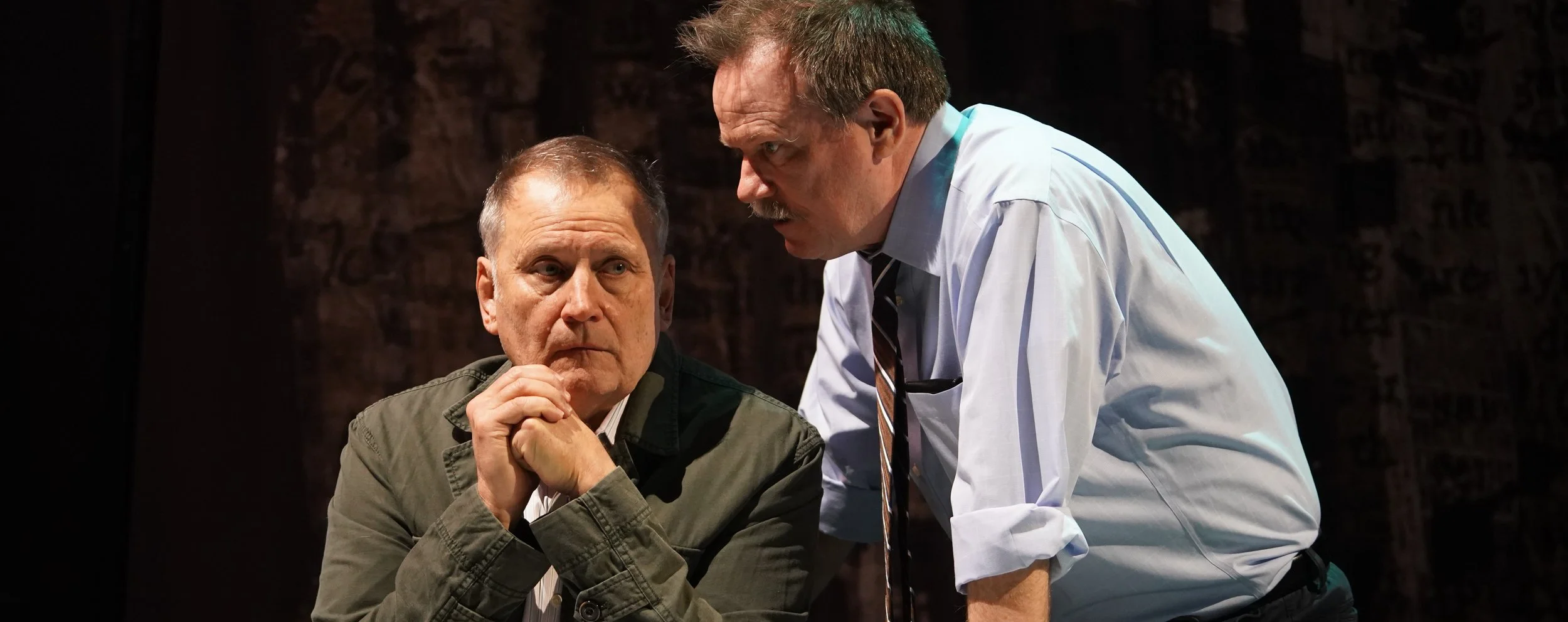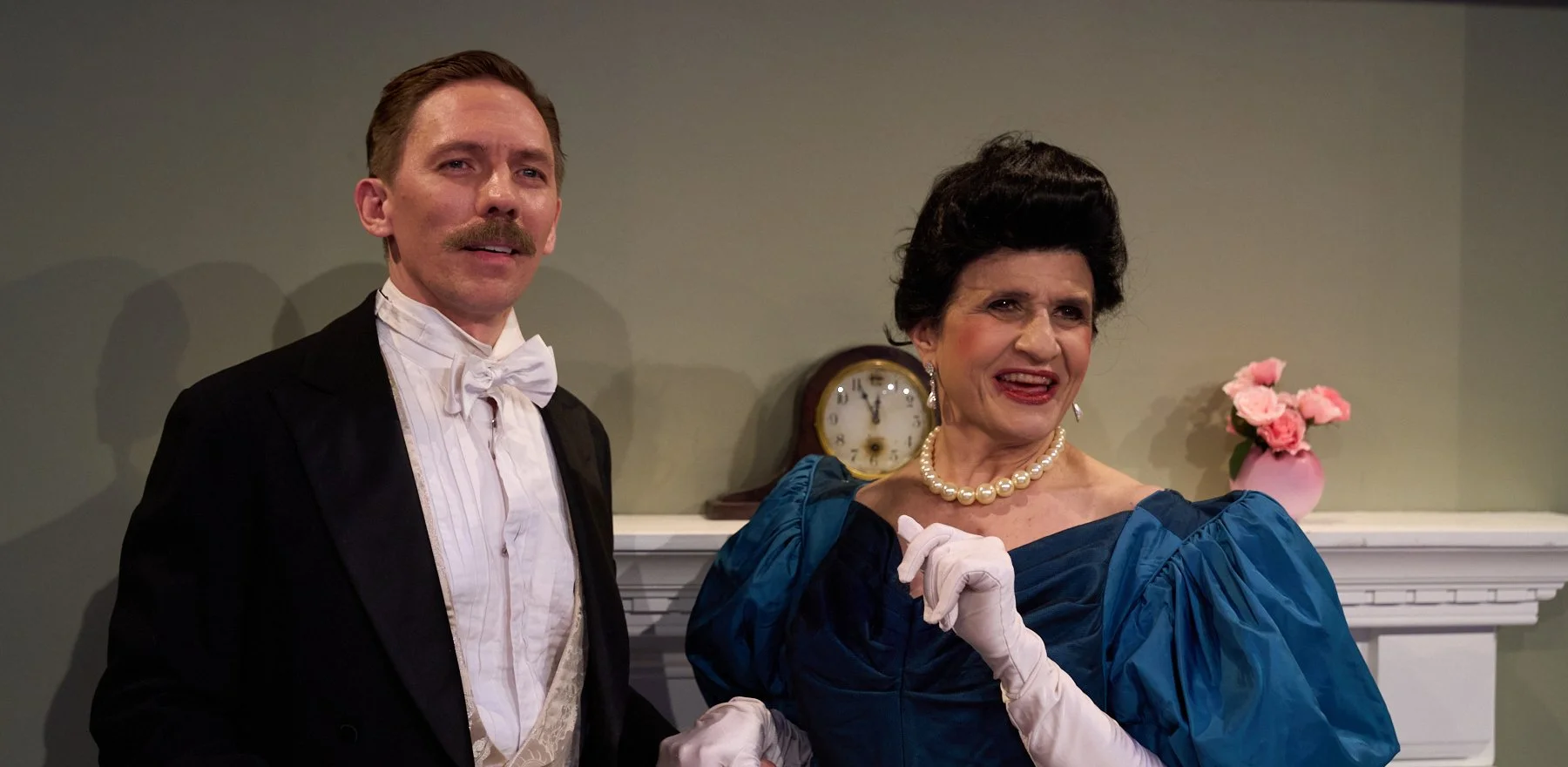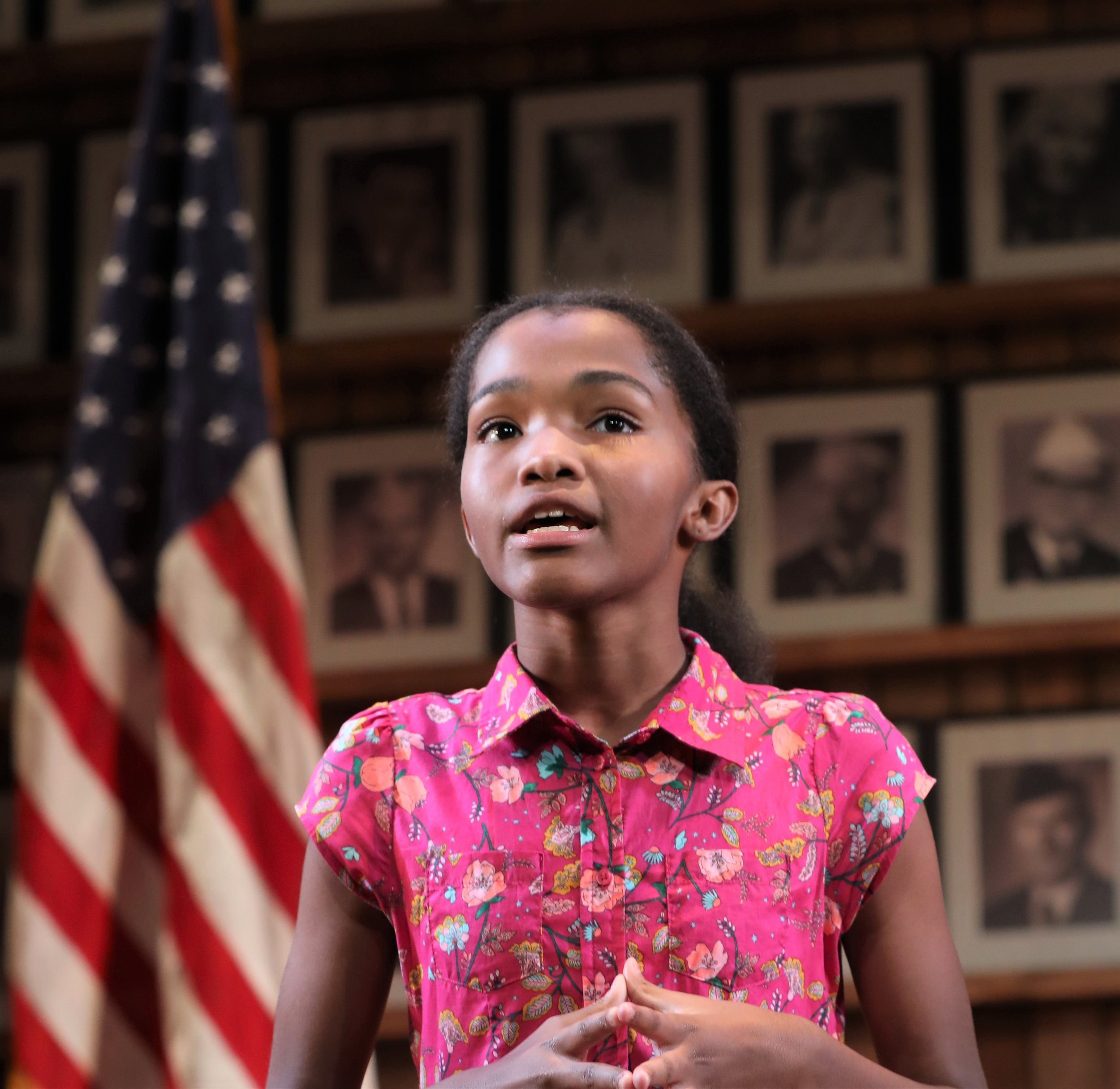Liliana Padilla’s new play How to Defend Yourself tells the story of college students attempting to make sense of relationships, sexuality, and consent. Co-directed by Padilla, Rachel Chavkin, and Steph Paul, the drama unfolds in a college gym where a group of women are meeting for a self-defense class. The class is the brainchild of Brandi (Talia Ryder) and Kara (Sarah Marie Rodriguez) after the violent sexual assault of a fellow classmate, Susannah, on campus. Brandi and Kara are in Susannah’s sorority, and they’ve decided to do more than just talk about the incident. “It’s so easy to do nothing. Right?” Brandi says. “We wanted to do something.”
Sanctuary City
The programs handed out at Martyna Majok’s Sanctuary City, produced by New York Theatre Workshop and presented at the Lucille Lortel Theatre, note that they have been “frozen in time”: they were printed for the play’s original run, which began in March 2020, and are now accompanied by a QR code providing updated information. This new information includes a remount director, Caitlin Sullivan, in addition to the original direction by Rebecca Frecknall.
What the Constitution Means to Me
Like many teenagers in the late 1980s and early 90s, Heidi Schreck was obsessed with Patrick Swayze. Unlike many teenagers, Schreck earned money for college by winning speech contests in American Legion halls across the United States. What the Constitution Means to Me, Schreck’s reimagining of those speeches, is less about America’s founding document than the country’s history of violence against women. The play’s humdrum title is misdirection. What the Constitution Means to Me is feminist agitprop autobiography masquerading as civics lesson, not blurring the line between the personal and the political but denying that such a line ever existed.
Mike Iveson as a member of the American Legion in What the Constitution Means to Me. Top: Heidi Schreck makes the political personal.
The play plants its femme-centric flag with preshow songs like Ariana Grande’s “God Is a Woman” and Dua Lipa’s “New Rules,” with the lyric “I keep pushin’ forwards but he keeps pullin’ me backwards.” These he’s dominate the stage, with row after row of photos of pale, stale, and male veterans lining the walls of Rachel Hauck’s Legion Hall set, reconstructed more from Schreck’s memory than precise research. The play is not anti-veteran, but neither does it equivocate about the primary source of violence against women. In fact, Schreck implicates the whole audience in this violence, or at least invites them to consider their complicity, by pretending to be her American Legion onlookers. “You are all men,” she says, though Schreck’s ultimately hopeful play implies that the condition is not terminal, and might even be treatable; Mike Iveson, who joins Schreck onstage as the competition arbiter, eventually removes his costume to reveal his “true” self, which Schreck hopes can represent “positive male energy.”
What the Constitution Means to Me is built on such fluctuations of identity, with Schreck slipping in and out of character as her younger and current selves. Her conversational introduction engenders an easy and immediate intimacy with the audience. Raised to be “psychotically polite,” Schreck is a generous, responsive entertainer, tailoring her performance to the crowd’s humor and at one point waiting for an overwhelmed patron to leave before continuing a story of abuse. Hers is no vanilla presence, however; after a few more walkouts, she conceded that “those of you who are still here seem to be nice.” Schreck spends most of the evening playing her current self, so What the Constitution Means to Me might be more appropriately termed a stand-up routine than a play.
This obscuring of identity, so well-suited to the theater, at once broadens and limits the play’s scope. The stories of Schreck’s great-grandmother, a mail-order bride from Germany who died of “melancholia” in a mental institution at age 36, and her mother, who was repeatedly sexually abused, are affecting and horrifying. Yet it is never apparent if Schreck is speaking as herself or as the version of herself created for this play, and when she conjures tears at her ancestors’ trauma, it’s hard to not feel like the audience is being taken for a ride, or at least instructed how to feel.
Rosdely Ciprain debates the Constitution’s virtues. Photographs by Joan Marcus.
The play’s coup is the inclusion of a high-school-age debater from New York City; Rosdely Ciprain and Thursday Williams alternate in the role. Though the debater doesn’t enter until late in the show, her arrival brings the hope that allows Schreck to cope with the “staggering facts of violence against women.” Schreck and her young companion engage in playful scripted debate, again uneasily walking the “real”/performed divide, but the vision of young, diverse womanhood leading the charge is undeniably moving.
To call What the Constitution Means to Me timely is to state the obvious, yet it’s sheer theatrical serendipity that this play, long in development, should come out right when the confirmation of a new Supreme Court Justice is affirming our country’s ugliest tendencies. There is no period in the history of this country, though, in which its anti-patriarchal message would not be timely; that’s the whole point. Schreck demonstrates again and again that women’s bodies, just like those of African-Americans and all immigrants deemed “bad,” have been left out of the Constitution from the beginning. At the end of the play, Schreck and the young debater model community-building by asking each other questions submitted by audience members. Yet despite the evening’s timeliness, its optimism feels increasingly ingenuous. The play’s final line, “Are we done?” spoken by the young debater as a comedic throwaway, is chilling in ways the play neither intended nor can do much about.
Heidi Schreck’s What the Constitution Means to Me plays through Oct. 28 at New York Theatre Workshop (79 E. 4th St.). Evening performances are at 7 p.m. Tuesdays through Thursdays and 8 p.m. on Fridays and Saturday; matinees are at 2 p.m. Saturdays and Sundays, with a special 7 p.m. closing performance on Oct. 28. For tickets and information, visit nytw.org.
Othello
Star wattage backed up by first-rate acting gives Sam Gold’s production of Othello a must-see status. Indeed, one suspects that without the celebrity power, Shakespeare’s rarely staged tragedy might have taken even longer to reappear on the boards. (John Douglas Thompson gave a superb interpretation in a traditional production back in 2009, although there is currently a rap version, Othello: The Remix, playing in midtown.)
A Heartsong for Hades
Anaïs Mitchell’s Hadestown, a concept album turned folk opera, adapts the myth of Orpheus by infusing it with American folk and New Orleans jazz music. Now playing at New York Theatre Workshop, Hadestown follows Orpheus (Damon Daunno) to hell and back again in pursuit of his young lover, Eurydice (Nabiyah Be), who has been lured there by the lord of the underworld, Hades (Patrick Page). Being a “folk opera,” the production is almost entirely sung-through, and Rachel Chavkin’s direction carries one song fluidly into the next. Like its classical source, Hadestown is alternatively gorgeous and dark, and the heartfelt commitment of the cast and musical ensemble brings the myth’s paradoxically sad beauty into full bloom.
As an energetic balance of hope and sadness, Hadestown finds light in the darkness and vice versa. The production’s casting reflects this balance: the naiveté of Be’s Eurydice and Daunno’s Orpheus contrasts starkly with the underworldly knowingness of Amber Gray’s Persephone and Chris Sullivan’s Hermes. Sullivan’s portrayal of his character is particularly complicated, as an enlisted messenger for the underworld with a soft heart for the young lovers. The Fates (played by Jessie Shelton, Shaina Taub, and Lulu Fall) are similarly uncommitted in their alliances, singing at times of great love and at others of shattering despair. As the brooding, unrelenting Hades, Page’s reverberating bass vocals figuratively open the doors of hell itself. In voice and movement, this hugely talented ensemble strikes near-perfect harmony in Act I. Act II contains major strengths, including some of the show’s most tear-jerking moments, but overall it lacks the simpatico energy of Act I.
Based on Mitchell’s celebrated folk album, music is the absolute center of Hadestown. Indeed, at times this music-forward production feels more like a highly-produced concert than a play—which works well with such a polished songbook. Michael Chorney and Todd Sickafoose’s co-arrangements and Liam Robinson’s musical direction sonically transform the space into a concert-in-the-round, immersing audiences with powerful voices and instrumentals.
Chavkin puts the space, reconfigured to stadium seating, to great use with entrances and exits from all angles and levels. Visually, Bradley King’s lighting synergizes with the music, especially in Act I’s penultimate “Wait for Me.” In this number, the Fates swing hanging wire lamps to and fro, visually embodying the show’s undulating emotional landscape between hope and uncertainty.
Adapting ancient Greek myths is nothing new for off-Broadway directors, but Mitchell and Chavkin’s Hadestown feels particularly fresh right now. In the “Wedding Song” Eurydice asks her new lover Orpheus how their young, penniless relationship will ever survive with “times being what they are—dark and getting darker all the time.” Eurydice’s ambiguity resonates in a time when the American middle class is dwindling and senseless acts of violence continue to erupt here and abroad. Later in Act I, Hades delivers a timely diatribe in the song “Why We Build the Wall,” echoing the latent xenophobia drummed up by the current election campaign’s fear-based politicking.
At the same time, amid this darkness, the pure love between Eurydice and Orpheus shines through—even Hades and Persephone's fraught relationship contains a hidden softness. Indeed, the sweet vulnerabilities embedded in the music and performances of Hadestown convey the very joys and hardships that make being human so painfully beautiful.
Hadestown runs through July 31 at New York Theatre Workshop (79 E. 4th Street between Bowery and 2nd Avenue.) No late seating. Tickets are available here or by calling 212-460-5475.














